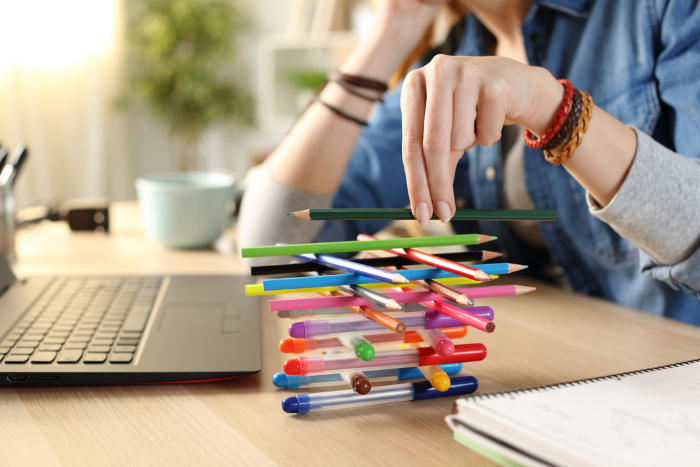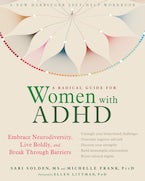By Sari Solden, MS, and Michelle Frank, PsyD, coauthors of A Radical Guide for Women with ADHD
ADHD hurts in ways that are both hard to understand for people who don’t live inside of it day in and day out, and often inexplicable for those who do. It can really get us down, and that’s okay. The key is not to stay down but to learn how to step up out of that shame-filled space.
We hope that this book has helped you realize that you needn’t make a den in the negative place or visit there too long anymore. You don’t have to hang back, waiting for ADHD to go away. You don’t have to hide yourself away. You don’t have to overexert yourself and burn out in service of passing for neurotypical or making up for “deficiencies.” You don’t have to sacrifice pleasure or self-care because your ADHD symptoms flared up this week. You don’t have to do it all alone.
A fulfilling life is the result of pursuing what truly, deeply lights you up inside. So here’s the big idea: you don’t need to fix yourself to start living, to feel good about yourself, and to show the world who you are. You have ADHD and you always will, which has to be okay—even if it doesn’t always feel okay—because it simply is the reality of your life. It doesn’t define you; it is simply a description of how your brain is wired.
Just as you must radically accept and acknowledge the basic facts of ADHD life, you also have a chance to choose to embrace a new perspective and some important facts that go with it, such as:
· ADHD struggles will continue to manifest in your life, and so will your strengths, character, and determination.
· Your brain requires more support and preventive care than those of others, which presents opportunities to invest energy and attention into caring for yourself the way you would care for others.
· You aren’t neurotypical and never will be, because ADHD isn’t curable. Still, you are the only you there is, with something unique to contribute to the world, no matter how large or small you think that something may be.
· You might need therapy and/or other kinds of professional help, and that provides you with a rare opportunity for personal exploration and the chance to destigmatize the process of embracing mental health needs for others.
· You may need medication, and that has nothing to do with who you are as a person.
· You will inevitably confront judgment and stigma, and this is a doorway to rediscovering yourself, reinventing your life, and helping others with ADHD do the same.
It might seem unfair, at first glance, that you got the ADHD end of the stick. Since we only get one shot at this life, you might feel worried that ADHD will get in the way of becoming the woman you know yourself to be on the inside, underneath it all. You might find yourself racing the clock, pushing yourself farther and faster, or, conversely, falling back and retreating into yourself and hoping tomorrow will be the day everything changes.
As you know, however, everybody’s got some suffering, some more than others. Many have great success, some more than others. Since no one makes it out alive, and this fact is the great equalizer of all things, it is also true that no single life is inherently more valuable or worthy or special than another.
Just like those neurotypicals you probably compare yourself to, you are allowed to have worth, value, and joy just as you are, with all of your challenges and hang-ups and fears and strengths and passions and quirks. Even with the forgetfulness, tardiness, messiness, and emotional storms.
You have strengths that have gotten you this far, and you may have contributions you have yet to offer. You may have a unique way of perceiving the world that helps you notice connections in hidden places. You may have an ability to deeply understand others’ experiences of difference or difficulty, and a persistent ambition to discover meaning and purpose in the face of adversity. You may have a capacity to model acceptance to your family and communities, and your spontaneous display of quirkiness can light up a room and give others the permission to be themselves too.
It’s not fair to yourself or to others to hold yourself back from life when you have so much to contribute as a woman who thinks differently in the world.
You have a unique perspective; share it!
You have a need for mental health care; advocate for it!
You think outside the box; encourage it in others!
You have intensity; light your fire and spread the light!
Because ADHD requires doing life differently, it can be a pathway to transformation if you show up and gently but persistently push the limits of your comfort zone. You no longer have to be of service to the pain that has tangled you in untruths and tethered you to a smaller life. Every day is a chance to live into yourself and your bright, bold life a little bit more—and a little bit more after that.
Since there’s no time like the present, you might as well start right where and as you are. It’s the only version of you out there, after all. So stop waiting and go ahead: dive fully into your completely, utterly, wondrously imperfect ADHD life. We dare you to be proud of it.
With gratitude for the lessons and inspiration that women with ADHD give us daily, we the authors leave you with this quote by Rainer Maria Rilke (1934, 27):
Be patient toward all that is unsolved in your heart and try to love the questions themselves, like locked rooms and like books that are now written in a very foreign tongue. Do not now seek the answers, which cannot be given you because you would not be able to live them. And the point is, to live everything. Live the questions now. Perhaps you will then gradually, without noticing it, live along some distant day into the answer.
With all our warmest wishes,
Sari and Michelle
Sari Solden, MS, is a psychotherapist who has counseled adults with attention deficit/hyperactivity disorder (ADHD) for thirty years. She is author of the pioneering self-help books, Women with Attention Deficit Disorder and Journeys Through ADDulthood.
Michelle Frank, PsyD, is a psychologist who specializes in the diagnosis, treatment, and empowerment of individuals with ADHD. Frank serves on the board of the Attention Deficit Disorder Association (ADDA) and presents nationally on issues related to ADHD and women’s empowerment.



 2024 Peace Playbook: 3 Tactics to Avoid Clashes with Your Partner
2024 Peace Playbook: 3 Tactics to Avoid Clashes with Your Partner